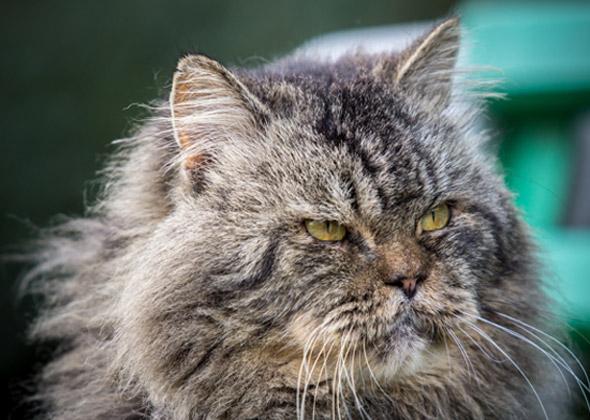
Getting old isn’t just for humans. Until someone creates the AARP for cats, it’s up to you to take care of your golden girl (or boy).
Facing health changes is never easy, but thankfully you and your cat can tackle this unique phase of life together.
While some cats can show signs of aging as early as 7 years, most cats will start to experience changes in health and behavior between the ages of 10 and 12 years.
Here’s what you need to know about your older cat, health issues to watch out for, and how to help your cat embrace the twilight years with health and vitality.
A Natural Process
Just like us humans, cats are prone to a number of health changes and complications in old age. While most of these are simply the natural progression of life, there are some things you can do to stave off the inevitable for as long as possible and help your feline friend enjoy a nice long healthy life.
As cats age, they’re more likely to suffer from:
- Arthritis
- Avoiding social interaction
- Cancer
- Decreased sense of smell
- Dehydration
- Dental disease
- Diabetes mellitus
- Diminished appetite
- Disorientation
- Hearing loss
- Hyperthyroidism
- Hypertension
- Inflammatory bowel disease
- Joint disease and pain
- Kidney failure
- Poor blood circulation
- Poor nail health
- Poor self-hygiene
- Skin infection
- Vision changes
- Weakened immune system
While many of these conditions are natural and expectable as your cat ages, that doesn’t mean you should ignore them.
Because cats are such routined creatures, if you notice any changes in your cat’s behavior, demeanor, or patterns it could be a sign that something’s wrong.
Catching a condition early on gives you and your cat a better chance of fighting back. Schedule a check up with your veterinarian at the first sign of change in your cat.
Signs Your Old Cat Isn’t Well

Cats are notorious for hiding their pain and discomfort (which, hello!, is why PrettyLitter exists). But as cats get up in age, they may start to show clearer signs that something isn’t quite right. Any changes in your cat’s behavior should be cause for concern.
While cats are extremely strong willed and adept at hiding pain, every cat has a breaking point. If your cat becomes suddenly aggressive for no clear reason, she may be masking internal pain.
Arthritis is quite common in older cats. Cats who become less active, stop visiting favorite perches, or begin taking new, easier routes around the house may be suffering from joint pain or disease.
Bathroom habits are another clear sign that something is wrong with your dear furry friend. More frequent urination, urinating outside of the litter box, depositing feces outside of the litter box, or depositing feces of a different color or texture (e.g., soft or runny) is a signal that Fluffy needs a check up. Pronto.
Similarly, a once “low maintenance” cat who never sought the need to spray or mark his territory may suddenly pick up some of these unpleasant habits if he develops hyperthyroidism. Female cats may also change their marking or social behaviors due to hyperthyroidism.
Any other changes such as increased shedding, drinking more water, avoiding social interactions, becoming withdrawn from their favorite person, eating on one side of the mouth or avoiding eating hard foods, and changes in sleeping patterns can all indicate that something’s up.
If you notice any of these changes - or other changes that you don’t recognize as normal for your unique cat - call your veterinarian for a check up.
Preventative Feline Health
If you have a senior cat in your home, here’s a checklist to revisit often for your older cat:
- The best thing you can do for your cat is to pay attention. You are your cat’s life partner. While you may have a human soul-mate competing for your affection, to your cat, you’re her whole world. Know your cat well and trust your instincts when you notice something is out of character for your furry love.
- Do a weekly at-home exam. Once per week, while you and your cat are bonding, sneak a closer look at your furry friend. Look into her eyes, inside her ears, and at her teeth and gums if you can. Gently touch her paws to see if she withdraws as if in pain. As you’re petting her, look for any abnormal bumps, changes in fur, or skin irritations.
- Schedule a semi-annual check-up. Just like us humans should see the doctor regularly, so should your cat. Take a proactive step in your cat’s health by taking your cat in for a wellness check every 6 months. If anything is wrong, catching it early can make a world of difference.
- Help your cat with proper grooming. As cats get older, they’re more likely to slack off on the personal hygiene front. Help your cat out by brushing her fur, removing any spots or tangles, and brushing her teeth.
In addition to the above routine, you may also need to make slight changes to your cat’s everyday lifestyle.
Senior Cat Food & Lifestyle Changes

As cats age, they are more prone to digestive issues. Keep an open dialogue with your doctor about your cat’s nutrition and switch to a senior cat food when the time is right. Senior cat foods can help prevent weight gain, help with digestion, and balance your cat’s internal chemistry to prevent urinary tract disease, diabetes, and other health problems.
For cats with arthritis, you may need to provide stairs up to food platforms if your cat can no longer jump comfortably. You may also need to consider moving your cat’s food and water bowl entirely. Low-profile litter boxes can help cats suffering from arthritis maintain proper bathroom habits.
While senior cats are often more likely to be calm and take on a Yoda-like zen mood, they’re not immune to stress. Minimizing changes in the home can help reduce stress and support a healthier senior cat.
Old cats are wonderful pets. In fact, some of the best cats to have are seniors, especially if you have young children who may not be ready for the wiley spontaneity of a kitten. But parenting an older cat comes with responsibilities too. Keep these tips in mind and you and your senior cat will enjoy countless happy days together.
----


Follow Us